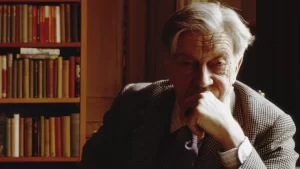We begin the week with a look at the interesting history behind the appointments that were made to the post of poet laureate during the 1960s to 1980s.
The Poets, Who Were Not, Laureate
 Released by the National Archives in Kew, official papers shed some interesting light on the rather bitter backbiting and infighting that took place around the names that were put forward for the position of UK Poet Laureate in both 1968 and 1972.
Released by the National Archives in Kew, official papers shed some interesting light on the rather bitter backbiting and infighting that took place around the names that were put forward for the position of UK Poet Laureate in both 1968 and 1972.
Downing Street ruled out some of the greatest British poets of the 20th century, and there were plenty of arguments and reasons why they chose to sideline these poets.
The role of poet laureate in the UK is one that dates back to the 17th Century, and the years since the very first poet was appointed to the position have seen the likes of William Wordsworth and Alfred Lord Tennyson being appointed.
These official papers which were released on 19th July, date from the 1960s to the 1980s and indicate that big names like WH Auden, Robert Graves and Philip Larkin were deemed to be completely unsuitable.
In 1967, following the death of John Masefield , who was poet laureate for 37 years, Downing Street officials had to draw up a list of all the suitable poets who should be considered. The idea of a poet laureate seemed a little archaic to many at that point in the “swinging 60s,” however, interest in poetry was on the increase thanks to the likes of Allen Ginsberg.
WH Auden was removed from the list of those who might be eligible as, in 1946, he had become a US citizen; John Betjeman was considered to have critical views about the establishment that were not wholly appropriate. Whilst many in the literary field considered Robert Graves to be the best available poet, he spent most of his time in Majorca and was critical of the role of poet laureate. Other names that were thrown into the ring, some of which were dismissed, included Stevie Smith, Cecil Day-Lewis, and the singer Donovan (who was suggested by Ginsberg).
On 14th September 1967, it was decided that Day-Lewis was the best poet for the job, and he was appointed, but the possibility of appointing poet laureates for Wales, Scotland and Northern Ireland was also considered.
Four short years later, the death of Day-Lewis prompted a repeat of the search.
Auden’s name was again suggested, and he was considered to be the bookies’ favourite however, the suggestion that he was the author of “The Gobble”, a “pornographic” poem, was seen as something that would reflect badly on the Queen, so he was dropped from the list. A new name was given some serious consideration at this point by the poet Philip Larkin. His dislike of public speaking and “reserved nature” meant he was quickly discounted. Adrian Mitchell and George MacBeth made the list but were dropped from the final selection, and Betjeman was appointed.
In 1984 Betjeman died, and there was much less heated discussion over his replacement. Larkin was proposed again, but one person objected. Ted Hughes was proposed by two individuals with no explanation, and he was appointed.
The post is no longer a lifetime position. Since 1999, appointments have been for a fixed term of 10 years, allowing for more consultation over the next names that should be up for consideration.


You must register to comment. Log in or Register.